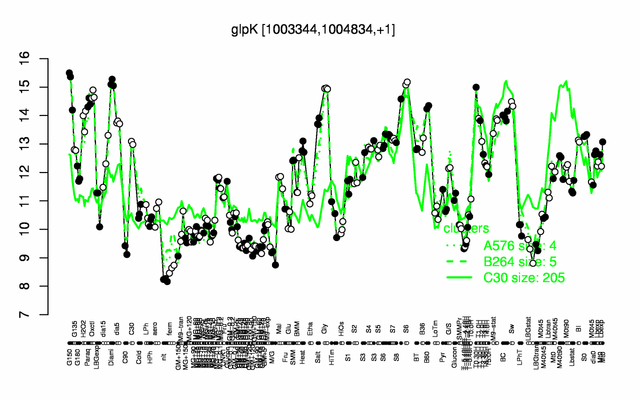GlpK
- Description: glycerol kinase
| Gene name | glpK |
| Synonyms | |
| Essential | no |
| Product | glycerol kinase |
| Function | glycerol utilization |
| Gene expression levels in SubtiExpress: glpK | |
| Interactions involving this protein in SubtInteract: GlpK | |
| Metabolic function and regulation of this protein in SubtiPathways: glpK | |
| MW, pI | 54 kDa, 4.985 |
| Gene length, protein length | 1488 bp, 496 aa |
| Immediate neighbours | glpF, glpD |
| Sequences | Protein DNA DNA_with_flanks |
Genetic context 
This image was kindly provided by SubtiList
| |
Expression at a glance PubMed
| |
Contents
Categories containing this gene/protein
utilization of specific carbon sources, phosphoproteins
This gene is a member of the following regulons
AbrB regulon, CcpA regulon, GlpP regulon
The gene
Basic information
- Locus tag: BSU09290
Phenotypes of a mutant
Database entries
- BsubCyc: BSU09290
- DBTBS entry: [1]
- SubtiList entry: [2]
Additional information
The protein
Basic information/ Evolution
- Catalyzed reaction/ biological activity: ATP + glycerol = ADP + sn-glycerol 3-phosphate (according to Swiss-Prot)
- Protein family: FGGY kinase family (according to Swiss-Prot)
- Paralogous protein(s):
Extended information on the protein
- Kinetic information:
- Domains:
- Modification:
- Cofactor(s):
- Effectors of protein activity:
Database entries
- BsubCyc: BSU09290
- UniProt: P18157
- KEGG entry: [3]
- E.C. number: 2.7.1.30
Additional information
Expression and regulation
- Regulatory mechanism:
- Additional information:
- number of protein molecules per cell (minimal medium with glucose and ammonium): 151 PubMed
- number of protein molecules per cell (complex medium with amino acids, without glucose): 6111 PubMed
- number of protein molecules per cell (minimal medium with glucose and ammonium, exponential phase): 263 PubMed
- number of protein molecules per cell (minimal medium with glucose and ammonium, early stationary phase after glucose exhaustion): 571 PubMed
- number of protein molecules per cell (minimal medium with glucose and ammonium, late stationary phase after glucose exhaustion): 1140 PubMed
Biological materials
- Mutant:
- BKE09290 (glpK::ermC) (available at the BGSC and in Jörg Stülke's lab)
- Expression vector:
- lacZ fusion:
- GFP fusion:
- two-hybrid system:
- Antibody:
Labs working on this gene/protein
Josef Deutscher, Paris-Grignon, France
Your additional remarks
References